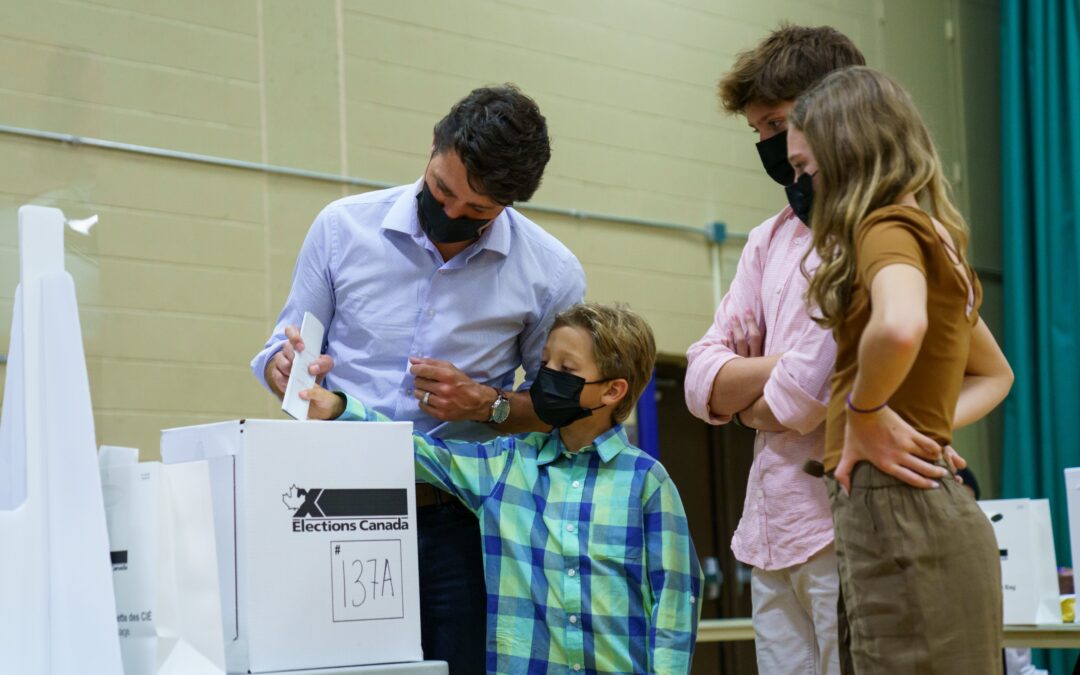Last night’s election closely mirrors the 2019 result, with the Liberals currently elected or leading in 158 seats (+1 from 2019), Conservatives 119 (-2), Bloc Quebecois 32 (+2), NDP 25 (+1), and the Greens 2 (-1). This has led many pundits to conclude that the entire election was a pointless and wasteful exercise.
Certainly, the Liberals did not get the majority mandate that they hoped for at the outset of the campaign, as their pre-election lead in the polls collapsed. But the Trudeau Liberals will not be disappointed with last night’s result – and not just because they have survived a near-death experience after the Conservatives eclipsed them in the polls early in the campaign.
The Trudeau government now has a new mandate from Canadians to implement significant new policies that were not featured in their 2019 platform – in particular, a national child care program, more ambitious climate change policy and measures to improve housing affordability. The public has also given a passing grade on the Liberals’ handling of the pandemic, including significant emergency spending which has ballooned Canada’s deficit to record levels.
At the same time, voters still want the Liberals to work with other parties in parliament. With mail-in ballots still being counted, the Liberals’ current tally is only twelve seats short of a majority – producing a stable minority government that could last for several years, especially in the wake of voter dissatisfaction with Justin Trudeau’s decision to call an early election. This means the Liberal government will have a relatively free hand early in their mandate to implement their new agenda.
With 1 million mail-in votes yet to be counted, and approximately 20 ridings where the margins are close enough to potentially flip, we need to await these results to conduct a full post-mortem on how each of the parties fared. If you haven’t already done so, make sure to RSVP to our post-election event this Thursday at: counselpa.com/event.
In the meantime, we can draw a few preliminary conclusions about last night’s result:
Cabinet considerations
The Liberals lost three cabinet ministers to defeat – all of them women. Minister of Seniors Deb Schulte in King-Vaughan, Women & Gender Equality/Rural Economic Development Minister Maryam Monsef in Peterborough-Kawartha, and Fisheries & Oceans Minister Bernadette Jordan in South Shore-St. Margarets all lost to Conservative challengers. To maintain gender balance in cabinet, this means that the Prime Minister will be elevating several women MPs to new cabinet posts. We expect the cabinet shuffle to be fairly significant, with multiple portfolios changing hands.
The West wants in
Last election, the headline after the votes were counted was the Liberals’ failure to pick up a single seat between BC’s Lower Mainland and Winnipeg. Last night, Liberal candidates George Chahal won Calgary-Skyview, and Randy Boissonault currently has a small lead in Edmonton Centre. Both MPs would be a safe bet to join cabinet – giving Alberta a much-needed voice in government. In addition, the Liberals picked up four seats in British Columbia – offsetting losses in Nova Scotia and Quebec.
Platforms matter
The Liberals were caught flat-footed at the start of the election with no policy platform, which is all the more shocking because they precipitated the election call. This was in stark relief to the Conservatives and the NDP, who published their platforms well before the Liberals did – contributing to their rise in the polls early in the campaign.
The Liberals published their platform mid-campaign – and did their homework by countering many of the other parties’ policy planks, including borrowing policies like the Conservatives’ gig economy measures. Three issues in particular put wind in the Liberals’ sails – firearms and vaccine passports as a wedge against the Conservatives, and climate change as a contrast with the NDP. These issues featured prominently in Justin Trudeau’s daily press conferences and in Liberal Party advertising.
Low turnout
While votes are still being counted, we know that just under 16 million were cast – accounting for only 59 per cent of registered voters. This is a massive 8 per cent drop compared to 2019. Given the result, the drop in turnout seems to have impacted all parties relatively equally.
Back to business
As the incumbent government, the Liberals should be able to resume regular government business fairly soon. We expect staff to return to ministers’ offices next week, but the government will continue to function in caretaker mode until the cabinet shuffle, expected to take place within a month’s time. That means decision-making on all but the most urgent matters will not occur until the new cabinet is in place. Parliament is likely to return in late October or early November with a Throne Speech, and possibly a Fall Economic Update to follow.
Insights by Sheamus Murphy, Partner, Federal Practice Lead.
 Sheamus has over 15 years of experience in government, communications and public affairs, including on Parliament Hill, at Queen’s Park and in the private sector. Before joining Counsel, he was Acting Vice-President, Corporate Affairs and Communications at Shoppers Drug Mart. At Queen’s Park, Sheamus served as Director of Communications to the Minister of Health and Long-term Care and in senior roles with the Attorney General and Minister of Training, Colleges and Universities.
Sheamus has over 15 years of experience in government, communications and public affairs, including on Parliament Hill, at Queen’s Park and in the private sector. Before joining Counsel, he was Acting Vice-President, Corporate Affairs and Communications at Shoppers Drug Mart. At Queen’s Park, Sheamus served as Director of Communications to the Minister of Health and Long-term Care and in senior roles with the Attorney General and Minister of Training, Colleges and Universities.

